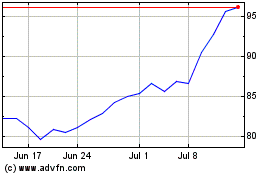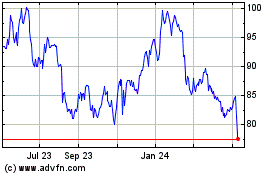U.S. Considers Sanctions Against Russia in Response to Hacks of Democratic Groups
August 12 2016 - 2:10AM
Dow Jones News
WASHINGTON—U.S. officials are discussing whether to respond to
computer breaches of Democratic Party organizations with economic
sanctions against Russia, but they haven't reached a decision about
how to proceed, according to several people familiar with the
matter.
Levying sanctions would require the White House to publicly
accuse Russia, or Russian-backed hackers, of committing the breach
and then leaking embarrassing information. The U.S. has frequently
opted not to publicly release attribution for cyber-assaults,
though Washington did openly accuse North Korea of carrying out an
embarrassing breach of Sony Pictures Entertainment Inc. in
2014.
The Federal Bureau of Investigation and U.S. intelligence
agencies have been studying the Democratic hacks, and several
officials have signaled it was almost certainly carried out by
Russian-affiliated hackers. Russia has denied any involvement, but
several cybersecurity companies have also released reports tying
the breach to Russian hackers.
On Thursday, House Minority Leader Nancy Pelosi (D., Calif.)
told reporters, regarding a breach of the Democratic Congressional
Campaign Committee, which spearheads the Democratic House
campaigns: "I know for sure it is the Russians" and "we are
assessing the damage."
She added, "This is an electronic Watergate…The Russians broke
in. Who did they give the information to? I don't know. Who dumped
it? I don't know."
Republican presidential nominee Donald Trump has publicly
disavowed any connection to the hacking of the Democratic National
Committee and other groups. "It is so far-fetched," Mr. Trump said
at a news conference last month. "It's so ridiculous. Honestly, I
wish I had that power."
Rep. Adam Schiff (D., Calif.), the top Democrat on the House
Intelligence Committee, said his panel was briefed on the matter
last week and that he is among those urging that "when the
administration believes it has sufficient evidence of attribution,
it will make that attribution public as well as consider any other
steps necessary."
The process of deciding on sanctions could be lengthy. Even if
U.S. officials have concluded the hackers were Russian-backed, they
must decide to disclose that publicly—then weigh a range of
possible reactions.
The U.S. and Russia are at odds over a variety of issues, from
the war in Syria to Moscow's annexation of Crimea, and U.S.
officials must decide whether this episode is worth exacerbating
those tensions.
In 2015, President Barack Obama signed an executive order making
it easier for the U.S. to impose sanctions against anyone tied to a
"cyber-enabled" activity that impacted U.S. national security,
foreign policy, economic health or financial stability.
This order was seen at the time as a way of warning China to
halt attacks aimed at U.S. companies, but it could also pave the
way for the U.S. to issue sanctions against Russians or anyone else
it believes was involved in a significant breach.
Many countries, including the U.S., steal information from other
nations using computer attacks, and to some degree that is
considered traditional espionage. But several former U.S. officials
said the DNC breach is different because the stolen information was
then released with the apparent purpose of embarrassing certain
individuals.
Officials still haven't determined whether the cyber-attackers
were attempting to influence the presidential election or simply
believed it was appropriate payback for alleged U.S. meddling in
other countries' elections.
"They believe we are trying to influence political developments
in Russia, trying to effect change, and so their natural response
is to retaliate and do unto us as they think we've done unto them,"
James Clapper, the U.S. director of national intelligence, said
last month. Still, he stopped short of saying Russia was
definitively behind the DNC breach.
The U.S. has already imposed an array of sanctions against
Russian individuals and entities in response to Russia's invasion
of Ukraine and annexation of Crimea.
(END) Dow Jones Newswires
August 12, 2016 01:55 ET (05:55 GMT)
Copyright (c) 2016 Dow Jones & Company, Inc.
Sony (NYSE:SONY)
Historical Stock Chart
From Aug 2024 to Sep 2024

Sony (NYSE:SONY)
Historical Stock Chart
From Sep 2023 to Sep 2024
